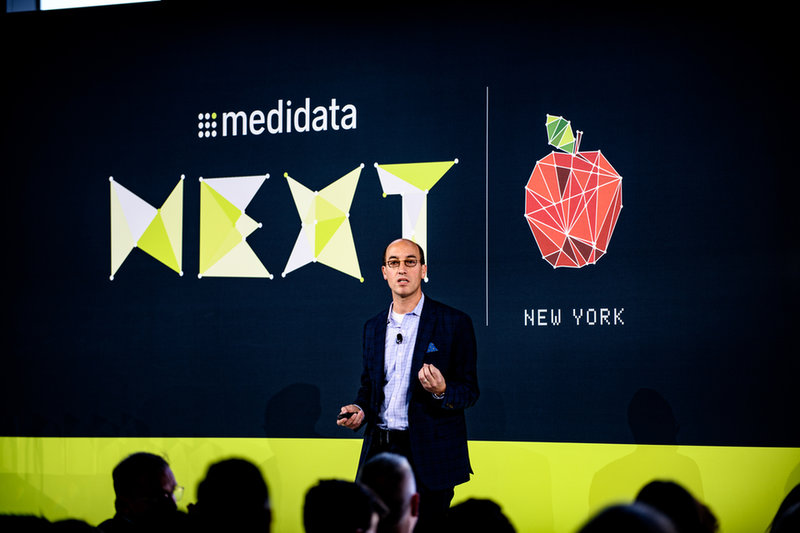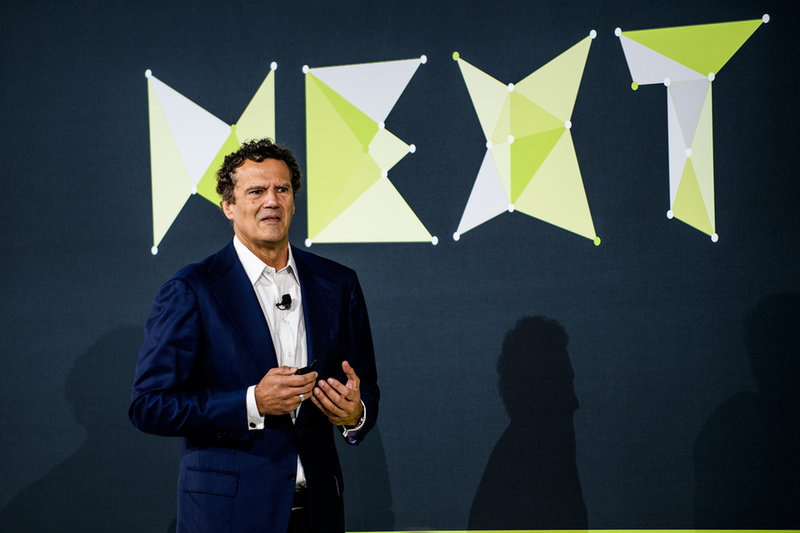Clinical Trials
Data overload: turning challenges into opportunities in clinical trials
Clinical research is garnering more data than ever before, but are we making the most of what is collected or are we at risk of getting overwhelmed by the sheer amount of data? This was a question high on the agenda at the recent Medidata NEXT conference. Susanne Hauner hears from Medidata’s leaders and customers how technology and processes need to evolve to enable better clinical outcomes.
"I
n 2018 we're going to create more data than we've created in all of time until 2018," said Medidata CEO Tarek Sherif in his keynote opening the NEXT conference. "Making sense of that data is what's so vitally important - and in our industry even more so."
How we can do better with data was a topic high on the agenda of the conference hosted in New York in October by Medidata, a company developing software-as-a-service solutions for clinical trials. Representatives from pharma companies, research organisations, technology developers and consultants came together at the event to discuss challenges in clinical research and how advances in technology can help to solve them.
"More data is being created today than ever before,” said Jeremy Sohn, vice president and global head of digital business development and licensing at Novartis, in his keynote. “And that's important because as a pharma company we’ve realised that we have, for many years, thought of ourselves as being a medical or biological science company. And we forgot in many respects that data, and for matter technology, have always been core to that mission.”
The mission, Sohn said, is to develop better drugs faster and at a lower cost. “It takes us longer to get drugs to market than ever before,” he said. “It costs us more money than ever before: 25 years ago it was $7m and seven years; today it's 12-15 years and more than $2bn. We can't afford to continue to allow those curves to expand.”
Pharma’s “data goldmine”: a powerful but untapped resource
Making more efficient use of clinical data has the potential to speed up the process to market, but the ever growing amount of data creates new challenges. The clinical “data goldmine”, as Sohn called it, has yet to be unlocked.
“As one of the largest pharma companies in the world we run hundreds of trials at any given point,” Sohn said. “We introduce over 100 new trials and 100,000 new patients a year, which means we are collecting more and more data.
“But the complexity of these trials is increasing. As much as we say we're going to be patient-centric and we're going to minimise the amount of data, the reality is that it's harder and harder to do that.”
We're sitting on a goldmine of data, and yet historically we haven't been able to access it.
This is because new technologies, such as the IoT and connected sensors, are only increasing the amount of clinical data that is collected. All this data then has to be mined across millions of patients, and ideally across multiple trials.
“One of the challenges that we have in pharma is, how many people can actually explore their clinical trial datasets across multiple clinical trials?” Sohn pointed out. “Historically for very good reasons - some technology, some regulatory, some operational, some just pure politics - we haven't been able to share that data or to view across that data.
“And yet think about how powerful those datasets are. We're sitting on a goldmine of data, and yet historically we haven't been able to access it.”

Jeremy Sohn, global head of digital business development and licensing at Novartis, presents at NEXT.
Making sense of the data will be an evolution
Medidata’s head of product and senior vice president Jackie Kent agrees that better data processing is one of the industry’s biggest challenges - and one that new technology development can help to solve.
"We've been talking a lot about our focus on the capability of ingesting our own data and other data and really providing those scientific insights to our customers,” she said. “Everyone knows there's so much good in the data that can help drive clinical decisions faster. We have to manage that data to provide those insights. Everybody is trying to do it as fast as they can. Where do you find the right and the richest data - that's a big focus for us and challenge for everybody right now.”
But with data collection growing faster than the processing capabilities, are we headed for data overload?
"I think everyone at this point is overwhelmed with the different kinds of data,” Sherif said. “I think the technology needs to continue to evolve.
We're in this catch-22 right now where we have ever-increasing amounts of data, but we don't know yet exactly what's important and what's not.
“Right now, curation of data is very difficult and time-consuming to do,” he explained. “In theory we should have the cleanest, easiest to use data. Take 15,000 studies, all done through a system, the data should all be uniform. It's not - mostly because of the way the industry captures the data. There's no homogenisation in between organisations in terms of whatever tests they're running, whatever conclusions they draw.
“So you have to clean that data. Until we find a way to do that more efficiently, or it's not as important for gleaning insights - which leads us to the point of where is AI these days and how useful is it really - until we can do that, I think we're going to find ourselves in a situation where we are going to be overwhelmed.”
“I think we're in this catch-22 right now where we have ever-increasing amounts of data, but we don't know yet exactly what's important and what's not. I think we're going to just keep slogging through for the next five or ten years. We are going to collect more data and in increments we're going to figure it out, but we're not going to get a big bang solution.”

Medidata CEO Tarek Sherif opening the NEXT event in New York.
The next step: merging data across different trials
One of the big challenges ahead, speakers at the event agreed, is finding new ways to merge and analyse clinical data across different trials.
“Our next challenge as a pharma company and as an industry is to bring all that data together, Sohn said. “We want to take all the data we've collected - from our research organisations, from genomics, from proteomics, the IoT, from our clinical trials, from real-world evidence - and bring it to the 100,000 healthcare professional interactions that we have in a day. Now, if we take all that data and we leverage the ability to pull all the data and analyse it and give real-time information to our field force...Think about that powerful that is.”
Kent emphasised that Medidata is also focusing on building capabilities to merge and curate data, within an organisation and beyond.
“Our investment is allowing us to bring in other people's data,” she said. “So if you're one of our customers and you've purchased a data source and you'd like that to be brought together with your other clinical data for us to help you drive a new trial, or a scientific decision, or some more safety information. We're really investing in that ingestion, that curation process.”
While technical barriers have been overcome with the development of cloud-based services in the past few years, regulatory concerns are still an issue.
The ability to merge and analyse data across trials and therapeutic fields could mean a huge leap forward for research, but implementing it is no easy feat.
Historically, Sohn explained, data largely remained isolated within one trial, mainly for regulatory reasons. For example, patient consent was generally limited to a particular study. Now, he said, companies are increasingly trying to ensure the upfront informed consent is clear on the future use of the data, allowing patients to agree to their data being revisited for other trials or therapeutic areas.
While technical barriers have been overcome with the development of cloud-based services, making it easier to merge and process previously isolated data, regulatory concerns are still an issue.
“You didn't want anyone else to see your data until it had clearly been approved,” Sohn said. “So we intentionally set up firewalls to say nobody can access that data, for security and regulatory reasons. That hasn't changed, all those rules are important, but we actually have much better controls over how we can manage that data now and so we can bring all this data together in ways that we just couldn't do before.”
What became clear at the NEXT conference is that a lot of work lies ahead in getting on top of the data challenge. But the clinical research community is keen to embrace new ways of working, and with the backing of new capabilities brought to the equation by technology developers, the evolution of more efficient, data-driven studies is well underway.
Go to top